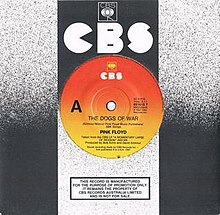The Dogs of War (song)
| "The Dogs of War" | ||||
|---|---|---|---|---|
 |
||||
| Single by Pink Floyd | ||||
| from the album A Momentary Lapse of Reason | ||||
| Released | Early 1988 | |||
| Format | 7" | |||
| Recorded | November – December 1986 | |||
| Genre | Blues rock | |||
| Length | 6:11 | |||
| Label | CBS Records | |||
| Writer(s) | David Gilmour, Anthony Moore | |||
| Pink Floyd singles chronology | ||||
|
||||
"The Dogs of War" is a song by Pink Floyd from their 1987 album, A Momentary Lapse of Reason. It was the third single from the album in the US and Australia. Live versions have an extended intro, an extended middle solo for the saxophone, a guitar and sax duel and a longer outro as compared to the album version. The track was a minor rock radio hit in the US and reached #16 on MTV's Video Countdown in May 1988.
"The Dogs of War" describes politicians orchestrating wars, suggesting the major influence behind war is money.
Musically, the song follows a twelve-bar blues structure in C minor, only with significantly different chord changes. A standard blues song in C minor would progress as C minor, F minor, C minor, G (major or minor), F minor, and back to C minor. "The Dogs of War", instead, progresses in this way: C minor, E flat minor, C minor, A flat seventh, F minor, and back to C minor. All minor chords include the seventh.
Singer David Gilmour often approaches the C minor chord by singing on the diminished fifth, G flat, before descending to the fourth, minor third, and root. This melody is also compatible with the next chord, E flat minor, in which G flat is the minor third. It also appears in the A flat seventh chord, as the dominant seventh.
The majority of the song is in a slow 12/8 time. After a bluesy guitar solo, the song switches to a fast 4/4 tempo for the saxophone solo. This is not unlike what happens in "Money", a minor-key blues-based song from The Dark Side of the Moon, in which a saxophone solos over the song's predominant 7/4 tempo before switching to a faster 4/4 tempo for the guitar solo. "The Dogs of War" also imitates "Money" in its ending sequence, with a "call and response" between Gilmour's voice and his guitar.
...
Wikipedia
